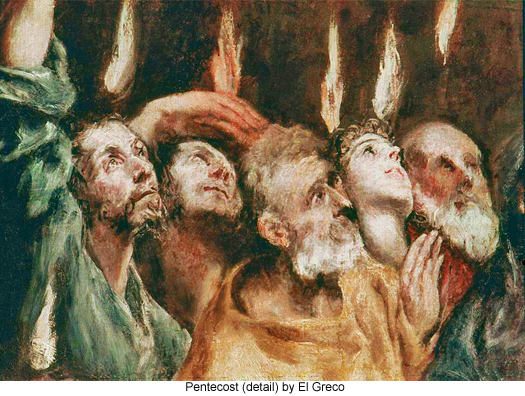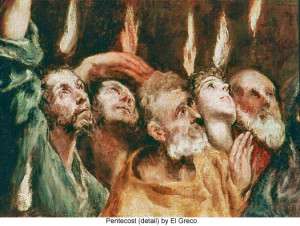Central idea: The Advocate, the Holy Spirit. Doctrine: The Holy Spirit as Advocate or Consoler. Practical application: Examination of conscience and Confession.
To view Lectionary 57, click here
Central idea: The Advocate, the Holy Spirit
Reading 1 Acts 15:1-2, 22-29
Some who had come down from Judea were instructing the brothers,
“Unless you are circumcised according to the Mosaic practice,
you cannot be saved.”
Because there arose no little dissension and debate
by Paul and Barnabas with them,
it was decided that Paul, Barnabas, and some of the others
should go up to Jerusalem to the apostles and elders
about this question.The apostles and elders, in agreement with the whole church,
decided to choose representatives
and to send them to Antioch with Paul and Barnabas.
The ones chosen were Judas, who was called Barsabbas,
and Silas, leaders among the brothers.
This is the letter delivered by them:“The apostles and the elders, your brothers,
to the brothers in Antioch, Syria, and Cilicia
of Gentile origin: greetings.
Since we have heard that some of our number
who went out without any mandate from us
have upset you with their teachings
and disturbed your peace of mind,
we have with one accord decided to choose representatives
and to send them to you along with our beloved Barnabas and Paul,
who have dedicated their lives to the name of our Lord Jesus Christ.
So we are sending Judas and Silas
who will also convey this same message by word of mouth:
‘It is the decision of the Holy Spirit and of us
not to place on you any burden beyond these necessities,
namely, to abstain from meat sacrificed to idols,
from blood, from meats of strangled animals,
and from unlawful marriage.
If you keep free of these,
you will be doing what is right. Farewell.’”
- Here we see a very early exercise of what today we call the Magisterium or teaching authority of the pope and bishops.
- If asked what must be believed or what must be done to be saved, people on their own will come up with a thousand different answers. Some will be flat wrong. Some will impose unnecessary burdens. Some will only make sense at one time in history. Some will zero in on one true aspect of the faith to the exclusion of the others. This is why there have been thousands of denominations of our separated brethren.
- To speak for Christ one must have a mandate from Christ. The apostles had this directly from Christ. Our pope and bishops united to the pope have this mandate, too.
- We can also see the mercy of Christ in this decision about Gentile Christians. It is hard enough to be a follower of Christ in this life. The Church did not want to impose any unnecessary burdens on Gentile converts.
- There is also a good lesson here for the laity living in the secular world. We don’t separate ourselves from the people around us but embrace whatever is normal, only rejecting what offends faith or morals. As the early Church writing Letter to Diogentus puts it, “With regard to dress, food and manner of life in general, [Christians] follow the customs of whatever city they happen to be living in, whether it is Greek or foreign” and “Like others, they marry and have children, but they do not expose them. They share their meals, but not their wives.”
- Exposure means to leave unwanted infants in the country or in dumps to die. Sharing their wives means mutually consenting adultery. The first centuries were not so different from the modern world.
Responsorial Psalm Ps 67:2-3, 5, 6, 8
R. O God, let all the nations praise you! or Alleluia
May God have pity on us and bless us;
may he let his face shine upon us.
So may your way be known upon earth;
among all nations, your salvation.May the nations be glad and exult
because you rule the peoples in equity;
the nations on the earth you guide.May the peoples praise you, O God;
may all the peoples praise you!
May God bless us,
and may all the ends of the earth fear him!
- The Catholic faith, given to the world by Christ, does embrace a true guide to how nations and their peoples should conduct themselves without imposing one culture on everyone.
- It is pretty much unknown today, but the various much-admired United Nations’ declarations of fundamental human rights owe their existence to the natural law tradition articulated by Catholic philosophers and theologians in the aftermath of World War II.
Reading 2 Rev 21:10-14, 22-23
The angel took me in spirit to a great, high mountain
and showed me the holy city Jerusalem
coming down out of heaven from God.
It gleamed with the splendor of God.
Its radiance was like that of a precious stone,
like jasper, clear as crystal.
It had a massive, high wall,
with twelve gates where twelve angels were stationed
and on which names were inscribed,
the names of the twelve tribes of the Israelites.
There were three gates facing east,
three north, three south, and three west.
The wall of the city had twelve courses of stones as its foundation,
on which were inscribed the twelve names
of the twelve apostles of the Lamb.I saw no temple in the city
for its temple is the Lord God almighty and the Lamb.
The city had no need of sun or moon to shine on it,
for the glory of God gave it light,
and its lamp was the Lamb.
- The Book of Revelation presents for us an image of the New Jerusalem or the Holy Catholic Church in its full glory.
- It is a gift from God: perfect, immense, beautiful, and filled with light.
- God himself provides the light so that everything is seen in the light of God by the light of God.
- It is the dwelling of God with redeemed humanity, with those who have kept God’s word.
- It is the fulfillment of Christ’s words: “Whoever loves me will keep my word, and my Father will love him, and we will come to him and make our dwelling with him.”
Gospel Jn 14:23-29
Jesus said to his disciples:
“Whoever loves me will keep my word,
and my Father will love him,
and we will come to him and make our dwelling with him.
Whoever does not love me does not keep my words;
yet the word you hear is not mine
but that of the Father who sent me.“I have told you this while I am with you.
The Advocate, the Holy Spirit,
whom the Father will send in my name,
will teach you everything
and remind you of all that I told you.
Peace I leave with you; my peace I give to you.
Not as the world gives do I give it to you.
Do not let your hearts be troubled or afraid.
You heard me tell you,
‘I am going away and I will come back to you.’
If you loved me,
you would rejoice that I am going to the Father;
for the Father is greater than I.
And now I have told you this before it happens,
so that when it happens you may believe.
- Through Jesus Christ, God has revealed mysteries we could never have discovered on our own.
- The greatest mystery is that within the only one God is a trinity of persons: The Father, the Son, and the Holy Spirit.
- If we love the Son and keep his word, the Son and the Father will love us and make their dwelling with us and send us the Holy Spirit as our advocate and teacher.
- The consequences in us of this indwelling of the Blessed Trinity are peace and joy.
Doctrine: The Holy Spirit as Advocate or Consoler
- As the weeks of Easter roll on, the Church begins to draw our attention to Christ’s Ascension and then to the descent of the Holy Spirit on the Church at Pentecost.
- In our Gospel reading today, Our Lord tells the Apostles that “the Advocate, the Holy Spirit, whom the Father will send in my name, will teach you everything and remind you of all that I told you.”
- “At work since creation, having previously ‘spoken through the prophets,’ the Spirit will now be with and in the disciples, to teach them and guide them ‘into all the truth’” (CCC 243).
- This is why on the question of how Gentile converts to Christianity were to live, the apostles could say with such confidence “It is the decision of the Holy Spirit and of us.”
- Jesus calls the Holy Spirit the Paraclete (meaning, “he who is called to one’s side” or “ad-vocatus.”) The Holy Spirit is at our side, speaking to us and on our behalf, as “consoler” and “spirit of truth” (CCC 692).
- Part of the work of the Holy Spirit in our interior lives is to prove we are wrong about sin (Jn 16:8-9).
- We are wrong about sin when we think that sin is our salvation. That is, we sin because we think the act will make us happy or happier.
- In reality, salvation is from Jesus whom the Father sent. So “the Consoler . . . gives the human heart grace for repentance and conversion.” (CCC 1433)
- When the Holy Spirit convinces us of sin, proving us wrong about it, we receive a double gift: “the gift of the truth of conscience and the gift of the certainty of redemption.”
- The truth of conscience is that we see that our sins really are wrong.
- The certainty of redemption is that through Christ we have God’s forgiveness.
- This is true consolation. (John Paul II, DeV 31§2; CCC 1848)
Practical application: Examination of conscience and Confession
- We are foolish (and unnecessarily so) if we feel we have to hide our sins from ourselves, if we dread admitting them to God, and if we are uncomfortable accusing ourselves of them in the confessional. The Holy Spirit wants to work with us so that our consciences will convince us we have sinned, if we have.
- Conscience is a judgment of reason. It works this way.
- I realize I have done X.
- I realize X is a sin.
- I realize I have sinned.
- The Holy Spirit helps our reason and our memory so we can properly make this judgment of conscience.
- At the same time, the Holy Spirit reminds us that Christ came to redeem sinners. In other words he came to redeem us. We are not happy about the sin but we are happy to know the truth about ourselves and the truth about Christ’s offer of forgiveness.
- This is why we should resolve to examine our consciences daily and to confess our sins in the Sacrament of Reconciliation regularly.
Written as an aid for homilists and a resource for the faithful, this doctrinal homily outline (1) provides insights into the Lectionary readings, (2) explicates a doctrine of Catholic Faith or morals from them, and (3) shows specific ways lay persons can live these truths. (To read more about this approach, click here.)
This outline is written to be in accord with the Homiletic Directory issued by the Congregation for Divine Worship and the Discipline of the Sacraments (2014). (To read an excellent summary of the Homiletic Directory, click here.)
The Homiletic Directory offers the following Catechism points and themes for the Sixth Sunday of Easter:
- CCC 2746-2751: Christ’s prayer at the Last Supper
- CCC 243, 388, 692, 729, 1433, 1848: the Holy Spirit as Advocate/Consoler
- CCC 1965-1974: the New Law fulfills the Old
- CCC 865, 869, 1045, 1090, 1198, 2016: the heavenly Jerusalem


Leave a Reply